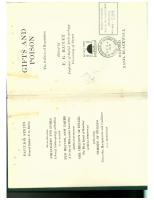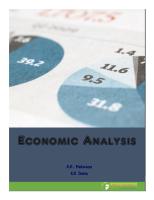Frederick Douglass Rhetorical Analysis [PDF]
Marissa Garrido Ms. Woelke AP Eng. Lang & Comp. 8 December 2020 Frederick Douglass Rhetorical Analysis Not only is Fred
22 0 30KB
Papiere empfehlen
![Frederick Douglass Rhetorical Analysis [PDF]](https://vdoc.tips/img/200x200/frederick-douglass-rhetorical-analysis.jpg)
- Author / Uploaded
- api-513539863
Datei wird geladen, bitte warten...
Zitiervorschau
Marissa Garrido Ms. Woelke AP Eng. Lang & Comp. 8 December 2020
Frederick Douglass Rhetorical Analysis Not only is Frederick Douglass a prominent activist, author, and public speaker, but Douglass is a renowned former escaped, slave. Within the time of the Civil War, Frederick Douglass was seen to be a leader in the abolitionist movement of ending the practice of slavery. From his autobiography, Narrative of the Life of Frederick Douglass, an American Slave, he uses rhetorical devices such as repetition, descriptive imagery, and exclamatory syntax to achieve his purpose of wanting slaveowners to have firsthand accounts of being in the horrid position of a slave From the beginning of Frederick Douglass’s narrative, he is seen to use repetition. As Douglass is describing the harsh weather conditions they have lived through, due to being under the ownership of Mr. Covey, he states how the slaves and himself, “Work, work, work, was scarcely more the order of the day than of the night” conveying the unethical nature of their schedule. The act of repetition in this quotation creates a hateful and spiteful emotion towards the slaveowner as the slaves are tirelessly worked all day. Further, into the narrative, Douglass uses descriptive imagery to show how the constant abusive treatment he receives from being a slave. He provides the statement of how “[He] was broken in body, soul, and spirit. [His] natural elasticity was crushed,... and behold a man transformed into a brute!” and this quote is seen to
invoke not only sympathy for Douglass but anger towards Mr. Covey and showing how he felt as if he was broken in every part of his body. Invoking these hateful emotions through the use of imagery suggests that Federick Douglass wanted the reader to feel as if they were experiencing these emotions with him. All in all, the use of repetition and descriptive imagery further show the horror slaves experience. Further, into the narrative, Douglass is seen to start talking using exclamatory syntax and rhetorical questions. As he is facing a dilemma, he asks God for guidance and “why was I born a man, of whom to make a brute! Is there….any God? Why am I a slave? I will run away. I will not stand it. Get caught, or get clear, I'll try it.” This is invoking a thoughtful conversation in the head of a slaveowner and providing a sympathetic feeling towards all slaves. In conclusion, the use of these rhetorical devices establishes the idea of horrors that come with being a slave, not only under Mr. Covey but speaking for all slaves’ lives.









